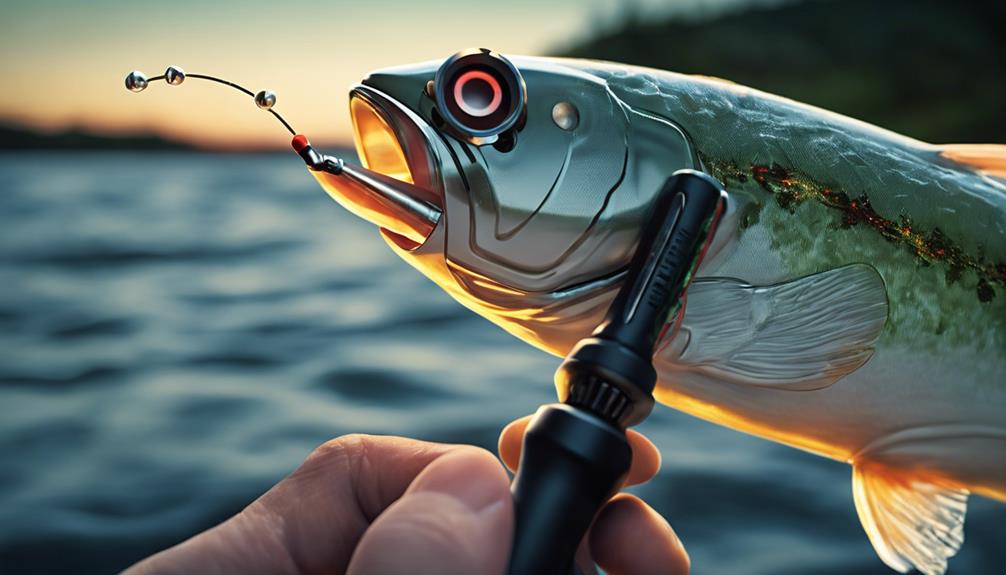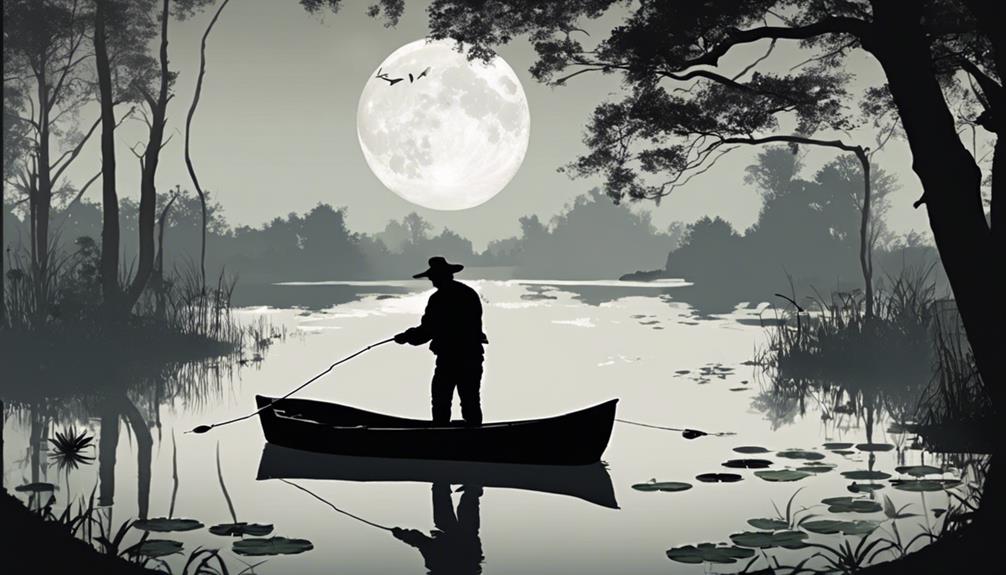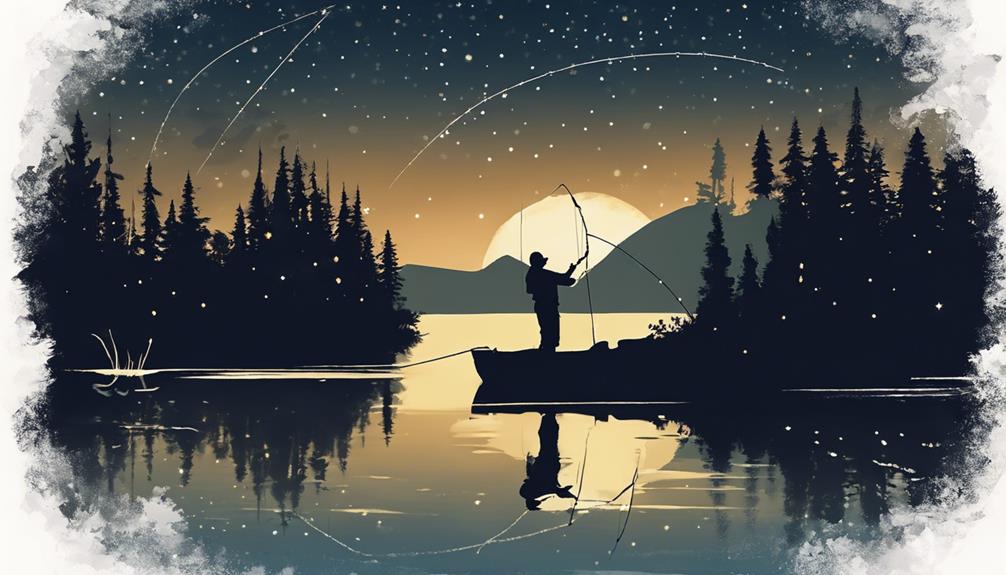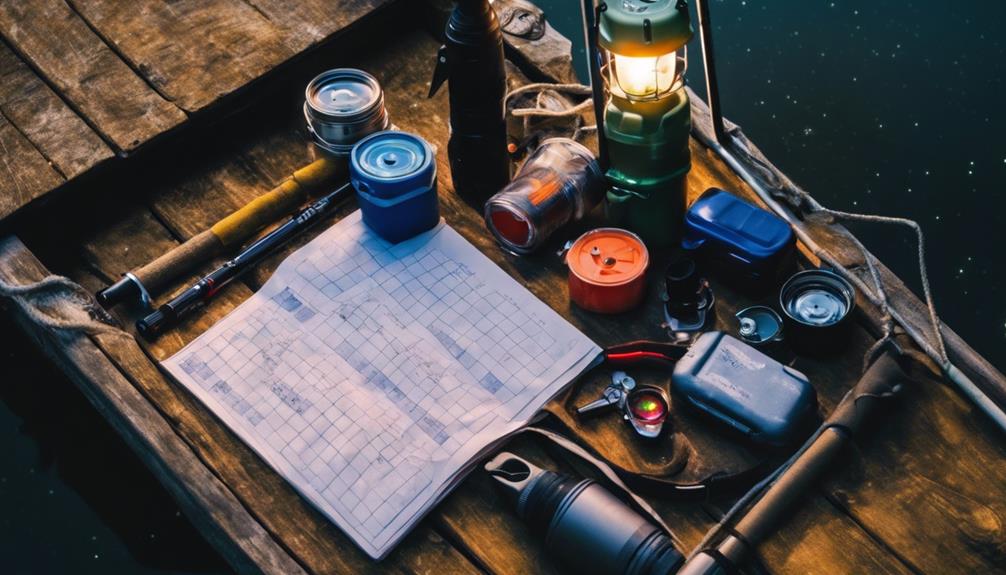To excel at night bass fishing, utilize lures that cater to bass sensory mechanisms. Opt for dark-colored lures that stand out in the dark and incorporate glow-in-the-dark features for enhanced visibility. Make noise and vibrations with your lures to attract bass in low-light conditions. Adjust your casting technique based on moon phases and employ stealthy, silent retrieves to mimic natural movements. Enhance your night vision for better bite detection with specialized glasses or red light headlamps. Mastering these techniques will boost your success under the cover of darkness.
Importance of Night Fishing for Bass
Night fishing for bass is crucial for anglers seeking to target this species during their most active feeding times. Understanding the benefits and challenges of night fishing can greatly enhance your success in catching bass.
One key benefit of night fishing is that bass are more active during the dark hours, making it an opportune time to target them. The cover of darkness provides a sense of security for the bass, encouraging them to roam more freely and feed actively.
However, night fishing also presents its own set of challenges. Limited visibility can make it harder to spot your targets and navigate the waters safely. To overcome these challenges, having the right gear is essential. Essential gear for night fishing includes high-quality headlamps or flashlights to illuminate your surroundings and help you see your equipment. Using lighted buoys or glow sticks on your lines can also aid in detecting bites in the dark.
In addition to lighting equipment, having the appropriate fishing gear is crucial for night bass fishing. This includes sturdy rods and reels, as well as lines that are strong enough to handle the fight of a bass in low light conditions. By being prepared with the right gear and understanding the benefits and challenges of night fishing, you can increase your chances of a successful bass fishing excursion under the stars.
Understanding Bass Behavior at Night
During the nighttime hours, bass exhibit distinct behavioral patterns that differ from their daytime activities, influencing their feeding preferences and movements. Understanding these behaviors is crucial for successful night bass fishing. Moon phases play a significant role in bass behavior. During a full moon, bass tend to be more active and may move into shallower waters to feed, while during a new moon, they might be more sluggish and stick to deeper areas.
Feeding habits also change at night. Bass are primarily visual feeders during the day but rely more on their lateral lines and sense of smell in low-light conditions. This shift impacts the types of prey they target and how they strike at lures. Water temperature is another crucial factor. As the water cools down at night, bass become more active and are more likely to feed. Nocturnal activity increases due to the cooler temperatures, prompting bass to venture out in search of food.
Bass exhibit a more aggressive feeding behavior at night, often striking at prey with more force. This can be advantageous for anglers using topwater lures or noisy baits that create vibrations in the water. Understanding these nuances in bass behavior at night can help anglers tailor their fishing techniques for a more successful outing.
Selecting the Right Lures for Night Bass Fishing
When selecting lures for night bass fishing, it's essential to consider the sensory cues that bass rely on in low-light conditions to effectively attract and trigger strikes. In the dark waters of nighttime fishing, bass primarily rely on their senses of hearing, vibration detection, and lateral line sensitivity to locate prey. Therefore, choosing lures that cater to these sensory mechanisms is crucial for a successful night fishing expedition.
For night fishing, lures that create noise and vibrations are highly effective in grabbing the attention of bass in the darkness. Topwater lures like buzzbaits or poppers with rattles can mimic the sounds of struggling prey on the surface, making them irresistible to bass hunting in the shadows. Additionally, using lures with built-in rattles or adding rattling attachments to your lures can further enhance their appeal in low-light conditions.
In terms of lure color selection for night fishing, it's important to focus on high-contrast options that stand out in the dark. Dark-colored lures like black or purple create silhouettes that are easily visible against the night sky, helping bass locate and strike at the bait more effectively. Furthermore, incorporating luminescent or glow-in-the-dark features into your lures can make them more visible and enticing to bass prowling in the depths during nighttime hours.
Techniques for Casting in the Dark
Select appropriate casting techniques to optimize your success in the dark waters of night bass fishing. When fishing at night, mastering your casting techniques is crucial for a successful outing. One effective method is to utilize moon phase casting. Understanding how the moon phase affects fish behavior can significantly impact your casting strategy. During a full moon, bass tend to be more active and may move into shallower waters to feed, so casting closer to the shore or shallow structures can yield better results. Conversely, during a new moon, bass may be deeper in the water, so casting further out into the dark waters could be more effective.
In addition to moon phase casting, employing night vision techniques can enhance your casting accuracy. Utilizing night vision goggles or lights can help you see better in the dark, allowing you to aim your casts more precisely towards potential bass hiding spots. Practice casting in different lighting conditions to adjust to the nuances of night fishing. Remember to use a fluid casting motion while minimizing noise to avoid startling the bass in the quiet of the night.
Utilizing Lights and Electronics Effectively
To optimize your success in night bass fishing, effectively utilize lights and electronics to enhance your fishing experience and increase your chances of a successful catch. Proper light positioning is crucial for visibility in the dark. Mounting lights on your boat can help illuminate the water around you, making it easier to see potential bass lurking below the surface. Positioning lights strategically to reduce glare on the water while still providing ample visibility is key.
In addition to lights, electronic devices such as depth finders and sonar can be invaluable tools for night fishing. Electronic depth finders help you locate underwater structures where bass might be hiding, allowing you to target your casts more effectively. Sonar technology can help you identify schools of fish or individual bass, giving you a better understanding of the underwater environment and increasing your chances of a successful catch.
When using electronics, ensure that they're properly calibrated and functioning correctly to provide accurate readings. Familiarize yourself with the features of your depth finder and sonar to interpret the information they provide accurately. By combining effective light positioning with the use of electronic tools like depth finders and sonar, you can significantly improve your night bass fishing experience and maximize your chances of landing that trophy bass.
Mastering the Art of Night Retrieval
Mastering the technique of night retrieval in bass fishing requires a keen understanding of the behavior and feeding patterns of bass during nocturnal hours. To excel in this aspect of night bass fishing, it's crucial to consider the impact of moonlight reflections on the water's surface. Bass are known to be more active and less cautious under the cover of darkness, but moonlight can create subtle reflections that may affect their behavior. When approaching fishing spots, opt for stealthy approaches to avoid spooking the bass.
During night retrieval, employing a silent retrieve is paramount. The quietness of your retrieval can make a significant difference in enticing bass to strike. By minimizing unnecessary noise, you can mimic the natural movements of prey in the water, increasing your chances of a successful catch. Additionally, incorporating strategic pauses in your retrieval can further entice bass. Pausing intermittently during retrieval can make your bait appear more lifelike and vulnerable, triggering a predatory response from the bass.
In mastering the art of night retrieval, the interplay between moonlight reflections, stealthy approaches, silent retrieves, and strategic pauses is key. By fine-tuning these elements and adapting to the nocturnal behaviors of bass, you can enhance your effectiveness in night bass fishing.
Tips for Sensing Bites in Low Light

When fishing for bass in low light conditions, detecting subtle bites can be challenging yet crucial for a successful catch. To improve your chances of sensing bites in low light, consider the following tips:
- Rod Sensitivity: Utilize a rod with high sensitivity to feel even the slightest nibbles or movements. A sensitive rod can transmit the subtle bites more effectively to your hands, enhancing your ability to detect when a bass strikes.
- Night Vision: Enhance your night vision by using specialized glasses or headlamps with red lights. Red light doesn't affect your night vision as severely as white light does, allowing you to see your rod tip and line movements clearly without startling the bass in the dark.
- Bite Detection: Pay close attention to any variations in tension or movement on your line. Even the most gentle taps or pulls could indicate a bite. Stay focused and be patient, as sometimes the bites during low light conditions can be more delicate and harder to detect.
- Fishing Success: Mastering the art of sensing bites in low light can significantly increase your chances of a successful night fishing trip. By honing your rod sensitivity and night vision techniques, you'll be better equipped to detect those elusive nighttime bass bites and reel in your catch with confidence.
Safety Precautions for Night Anglers
Night anglers must prioritize safety by implementing essential precautions to ensure a secure and enjoyable fishing experience in the darkness. Emergency preparedness is crucial for night fishing. Always inform someone of your fishing plans, including your location and expected return time. Carry a fully charged cell phone and a portable charger in case of emergencies. Additionally, pack a first aid kit, a flashlight with extra batteries, and a whistle to signal for help if needed. These items are essential for handling unexpected situations in the dark.
Wildlife encounters are a potential risk when night fishing, so it's important to take precautions. Be aware of your surroundings and avoid areas known for high wildlife activity. Make noise while moving around to alert animals of your presence and reduce the likelihood of surprising them. Keep a safe distance from any wildlife you encounter and never attempt to feed or approach them. Remember that some animals are more active at night, so staying vigilant is key to ensuring your safety.
Prioritizing emergency preparedness and being cautious of wildlife encounters are fundamental aspects of night fishing safety. By following these precautions, you can mitigate risks and enjoy a successful and secure night fishing experience. Stay informed, stay prepared, and stay safe out there on the water.
Frequently Asked Questions
How Can Moon Phases Affect Bass Feeding Behavior at Night?
During different lunar phases, bass feeding behavior at night can vary. Lunar cycles have been linked to changes in bass movements and nighttime feeding habits.
The moon's illumination can impact how active and aggressive bass are in seeking prey. Understanding these patterns can help you anticipate when bass are more likely to be actively feeding during the night.
Are There Specific Colors That Work Best for Night Bass Lures?
When fishing for bass at night, using glow baits and flashy lures can increase your chances of success. Dark colors and natural patterns tend to work best in low light conditions. These colors stand out in the darkness and can attract bass to your lure.
Incorporating these elements into your nighttime fishing arsenal can help you reel in more bass when the sun goes down.
Can Underwater Structure Impact Bass Movement During the Night?
Without the context of effective night bass fishing techniques, it's crucial to understand how underwater structures impact bass movement at night. Depth variations in these structures can influence bass behavior and feeding patterns.
Temperature changes around these underwater features may also affect how bass move and feed during the night. By considering these factors, you can strategically target bass in their preferred environments and increase your chances of a successful night fishing expedition.
Is There a Recommended Line Weight for Night Bass Fishing?
For night bass fishing, the recommended line weight should be around 12-15 pounds. This range provides the balance you need for sensitivity to detect subtle bites while also having the strength to handle the fight.
When considering rod sensitivity, a lighter line weight can enhance your ability to feel even the slightest nibbles.
Moreover, adjusting reel speed to match the line weight can improve your overall control and responsiveness when reeling in those bass at night.
What Are Common Mistakes Anglers Make When Fishing for Bass at Night?
When fishing for bass at night, common mistakes include not considering light pollution, which can affect bass behavior, and not navigating properly in low light conditions.
Sound disturbances, like loud talking or music, can spook bass. Additionally, excessive boat traffic can disrupt the feeding patterns of bass.
To maximize success, ensure you're mindful of these factors and adjust your approach accordingly for a more productive night fishing experience.
Conclusion
In conclusion, effective night bass fishing techniques require a deep understanding of bass behavior, the right selection of lures, proper casting techniques, and the use of lights and electronics.
Mastering the art of night retrieval and being able to sense bites in low light conditions are also crucial skills for successful night fishing.
Remember to prioritize safety precautions while venturing out for night fishing adventures to ensure a successful and enjoyable experience.



